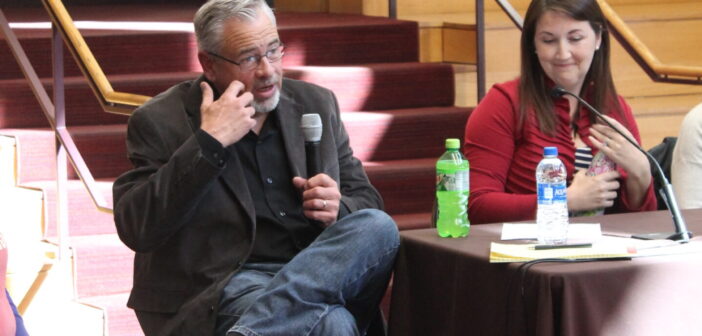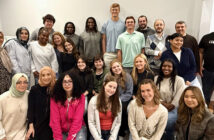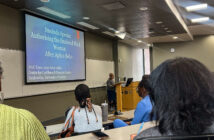Published poet, game show contestant and Lehigh professor denote just a few experiences on Bob Watts’ resume.
Watts always knew writing was his calling, and he’s been doing it his whole life.
He said he still remembers the first poem he wrote as a lovesick eighth grader — it was his first piece of writing he classified as poetry due to its emotion.
It wasn’t until Watts attended North Carolina State University for a master’s degree in creative writing that he said he began to write poetry seriously.
He wasn’t able to get into a certain class one semester, so he took a poetry course instead.
Watts said that class changed his life.
“For the first time with any teacher I had, (my professor) taught poetry as a craft,” Watts said. “This thing taught me about meter, rhyme and prosody in general. I had what my wife likes to call my ‘Come to Jesus moment,’ where I realized that is what I wanted to do with the rest of my life.”
In one of Watts’ published poem collections, “Past Providence,” he talks about how he lost his faith in God. He now often tells students he was “raised a baptist but is now a poet” because poetry provided him with a connection to something larger than himself.
A love for game shows
Before Watts fell in love with poetry, he said he has always loved learning.
Throughout his time at Appalachian State for his undergraduate education, North Carolina State University for his master’s and the University of Missouri-Columbia for his Ph. D. Watts said he participated in the College Bowl, an academic trivia competition known as “the varsity sport of the mind.”
When the game show “Who Wants to be a Millionaire” came out, he decided to put his trivia knowledge to the test.
To apply to the show, Watts said he called an application phone number and answered questions hoping to make it through the first round. After a handful of tries, he finally got a callback in 2000 and was eventually flown out to New York with his wife for filming.
While on the show, Watts wasn’t fast enough to answer a question correctly during the segment “Fastest Finger First” but was told to stick around as he might get another chance. When another contestant missed a $300 question, Watts was given the opportunity to continue playing.
When he finished the game, he had won $125,000, which he said he and his wife used to travel to France and England and put a downpayment on a house in Pennsylvania.
He later applied to be a contestant on Jeopardy — a show he loved as a kid. He said he took the show’s written practice tests several times and did well on them, but he didn’t get a callback until 2004.
Jeopardy flew him and his wife out to Los Angeles, California, to film. Watts said he was in second place on the last question before betting everything he had, losing it all and dropping to third place. He walked away with $1,000.
Entering academia
When Watts was offered a teaching fellowship, he said he only accepted to become a better writer and because the salary was the same as his midnight shift at UPS.
Watts came to Lehigh as a professor of practice for three years at a time where there were no other poetry professors. When the department held a national search for a tenure-track poet, he secured the position and has been at Lehigh ever since.
He now teaches Introduction to Poetry and Advanced Poetry Writing.
Emily Friedman, ‘23, Watts’ former student, said Watts sometimes held class outside to help students focus on incorporating sensory details into their poetry. She said he encouraged them to be in the moment and describe things in great detail, using all of their senses.
“He was very quiet at first,” Friedman said, “but he started talking about poetry and something that he loves. You could really tell that he valued the art of it.”
Friedman said Watts inspired her to write better and think more creatively.
Sabrina Trabish, ‘23, another former student of Watts, agreed. She said he energized students to be excited about their work.
“He was really passionate about having his students become passionate about their own writing,” Trabish said.
Trabish said Watts occasionally held one-on-one meetings with students instead of regularly scheduled classes to discuss their poetry. His individualized feedback showed her he cares about his students.
Watts said there is a poet and poem out there for everybody.
“One that will speak to you, one that will move you, that will change you in some way,” Watts said. “Everybody needs to read poetry. It would be good if everybody read mine, but everybody needs to read poetry, period.”






Comment policy
Comments posted to The Brown and White website are reviewed by a moderator before being approved. Incendiary speech or harassing language, including comments targeted at individuals, may be deemed unacceptable and not published. Spam and other soliciting will also be declined.
The Brown and White also reserves the right to not publish entirely anonymous comments.